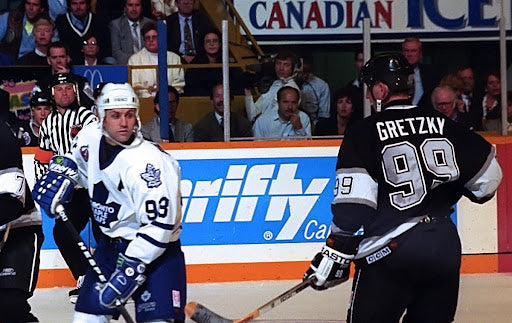Doug Gilmour

#93 Doug Gilmour
It’s About the Team
AUTHOR/EDITOR: JENNIFER J. LACELLE
DECEMBER 27, 2021
It all started with a small icy patch on a sidewalk in Kingston, Ontario for Doug Gilmour, famously number 93 for the Toronto Maple Leafs, who wound up becoming one of hockey’s legendary players over the course of his career.
Now retired from actively playing hockey, after twenty years on the ice, Gilmour’s record speaks for itself. He won the Stanley Cup in 1989, played with the team that won The Canada Cup in 1987, and found himself in the Hockey Hall of Fame.
The Beginning
Gilmour began playing in house leagues when he was five years old and by the time he reached eight he was starting to skate in the competitive teams.
“Then past that you try to make the all-star team,” he says.
Gilmour recalls seeing him play during his junior years but Dave eventually went and played in the American leagues. Gilmour was about five at that point and said because satellite television didn’t exist, he couldn’t continue watching his brother.
He does remember wanting to do the same thing as Dave, but the biggest influence was watching the big leagues on television and then trying emulate those players.
“Obviously, my dad helped coach a lot,” Gilmour says.
He also says his father taught him what work ethic meant and demonstrated this through a story of his childhood. Gilmour recalls playing two games in particular where, and the first was his best game ever having scored three goals. However, his dad didn’t like that game and when they got home, he went to grab his equipment but his dad told him to leave it where it was.
In the next game, Gilmour didn’t score a single shot but he was working harder than ever to do well. When they got home, he intended to leave his equipment but his dad told him to get back there and grab it, stating his father loved that second game because he put in the extra work.
Gilmour says he learned a lesson on hard work very fast that day. In 1980, Gilmour was drafted as a junior to the Cornwall Rails which also happens to be the first step into potentially playing in the big leagues for an “Ontario boy.”
However, he wasn’t drafted further than that by scouts, citing to his weight (a mere 145 pounds). Though he was finally drafted after playing three years in the junior league. It was expected he would be picked in the 4th or 5th round, but it wouldn’t occur until the 7th.
Even after all that, Gilmour was still told he was too small but that just encouraged him, intrinsically, to “work that much harder” and admits he was a little frustrated at not being drafted higher.
Playing with the Big Leagues
He says moving into the major leagues was “nerve wracking” because as a new player, your biggest goal is to ensure your team, the coaching staff and the general manager are all happy with your performance. It’s a player’s opportunity to shine, and when your first game as a rookie is at a mere 20 years old the pressure feels more intense.
“You gotta be a sponge and observe what other people do to make yourself better,” he says. He further says that while it’s easier to compete in the younger years, the most difficult aspect is still remaining steadfast in the wake of pressure.
When someone is being paid as a top player, it’s a great deal of stress to maintain or develop their skills, but that stress grows each year as players age.
In the later years of someone’s career, they have to work harder because younger, newer players want the job. He further says his mind was always saying, “I’m gonna win this; you’re not going to get my job.”
In his 20th season (2003), in the first game after being traded back to Toronto, his knee was injured. Gilmour knew it was time to retire, not thinking he would be able to recover to his full abilities. While 20 years is a long period to play, and the body endures a great deal, he would definitely do it again.
Of course, personally, his major highlights were playing with the Toronto Maple Leafs, winning the Stanley Cup, winning the Canada Cup and being inducted in the Hockey Hall of Fame (2011). It made him the 17th player the TML have honoured, and in 2009 they moved his number #93 to the rafters of the Air Canada Centre.
While he’s proud of the accomplishments throughout his playing career, he says the goal was always to be a good team member and player, as well as “making the people around you better.”
The Second Wind
When Gilmour initially retired, he wanted to do something that wasn’t related to hockey. It was time for a different start, but he did eventually return to the sport.
Gilmour was able to spend approximately eight to nine years with his dad and close to ten with his mom. After coaching for a few years, he became the general manager (2011-17) of the team and then president (2017-19). Overall, he spent 11 years with the Kingston Frontenacs before returning to the Toronto Maple Leafs once more in 2019 as the community representative.
However, during COVID, the activities of the position have moved from in-person interactions with fans and doing live charity events to hundreds of online cameo and zoom meetings. Which, he points out, has been just as fun and keeps him busy.
Of his overall career, Gilmour is proud of where he is and if not for being chosen in the 7th round of drafting, he thinks he may not have made it.
He notes that a lot of people chosen in the first few rounds don’t always work as hard as the ones who get picked later and it can make a difference, saying it’s concentration, practice and competing every single day. “I knew I had to get better,” he says. “It’s such a team game, you never make it on your own.”
